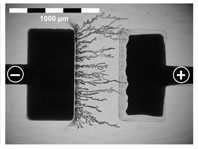Published online by Cambridge University Press: 19 July 2017

Operational lifetime is a critical performance parameter of organic electronic devices and can be cut short by multiple degradation mechanisms. One supposed cause is metal migration between the electrodes, which, however, is difficult to study independently of other failure modes. We present a setup, which excludes such competing processes and demonstrates that silver (Ag) electrochemical migration through organic optoelectronic materials occurs predominantly by cation transport. Metal dendrites form at the cathode, eventually causing short circuits between the electrodes. Lifetime studies with organic light-emitting diodes containing Ag electrodes suggest that results obtained with our setup can provide relevant information about degradation in real devices.
To send this article to your Kindle, first ensure no-reply@cambridge.org is added to your Approved Personal Document E-mail List under your Personal Document Settings on the Manage Your Content and Devices page of your Amazon account. Then enter the ‘name’ part of your Kindle email address below. Find out more about sending to your Kindle. Find out more about saving to your Kindle.
Note you can select to save to either the @free.kindle.com or @kindle.com variations. ‘@free.kindle.com’ emails are free but can only be saved to your device when it is connected to wi-fi. ‘@kindle.com’ emails can be delivered even when you are not connected to wi-fi, but note that service fees apply.
Find out more about the Kindle Personal Document Service.
To save this article to your Dropbox account, please select one or more formats and confirm that you agree to abide by our usage policies. If this is the first time you used this feature, you will be asked to authorise Cambridge Core to connect with your Dropbox account. Find out more about saving content to Dropbox.
To save this article to your Google Drive account, please select one or more formats and confirm that you agree to abide by our usage policies. If this is the first time you used this feature, you will be asked to authorise Cambridge Core to connect with your Google Drive account. Find out more about saving content to Google Drive.